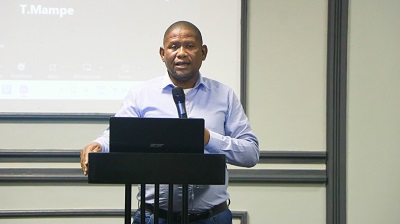By: Thandiwe Kubere
Maseru
Transformation Resource Centre (TRC), MISA Lesotho, and the University of Pretoria launched the Digital Rights Report that covers discussions on various thematic areas of the internet including privacy and data protection; privacy in the digital age; restrictions of freedom of expression; regulation of emerging technologies; and surveillance cybercrimes; media freedom and regulation and digital inclusion.
Digital rights are an essential aspect of modern life, encompassing the entitlements and freedoms that allow individuals to access, use, create, and publish digital media.
They also include the rights to use computers, other electronic devices, and communication networks. These rights are closely linked to fundamental human rights such as freedom of expression and privacy.
In the contemporary digital landscape, the concept of digital rights has emerged as a cornerstone of civil liberties. Author of Digital Rights in Lesotho: A Situational Analysis, Dr. Matšepo Regina Kulehile emphasizes that these rights are the digital counterparts of fundamental human rights.
Dr Kulehile declares that through rigorous analysis and thoughtful exploration, the report highlights the complexities and challenges inherent in safeguarding digital rights on the continent, thereby informing policy-making, shaping legal frameworks, and fostering greater awareness and advocacy on digital rights issues in Lesotho and beyond.
The study is an extension of the Digital Rights in Southern Africa project that was undertaken by the Centre for Human Rights in 2022 and 2023, established and universally recognized.
The report highlights that access to the internet in Lesotho is on the rise, yet it faces significant hurdles stemming from its Information and Communication Technology (ICT) infrastructure, the affordability of internet services and devices, and a lack of widespread ICT proficiency.
Despite the manifold advantages the internet offers, its usage can encroach on fundamental human rights. These violations often arise from cyber-security threats compromising users’ privacy rights, and surveillance via data collection, among other factors.
“Safeguarding human rights online, or digital rights, is important for leveraging the internet’s full potential. Consequently, regulations governing internet and digital technologies should be implemented, ensuring compliance with established international human rights standards”, she enlightens.
At the heart of digital rights is the protection of fundamental human rights.
In an era where digital presence is nearly as significant as physical existence, the rights to privacy, freedom of speech, and access to information must be fiercely protected online, just as they are offline.
The digital realm should not be a place where these rights are compromised; instead, it should be a haven where they are respected and upheld. Sharing sentiments is MISA Lesotho’s Programmes and Resource Mobilisation Manager, Mzimkhulu Sithetho, who expresses the significance of having access to information.
He says, “We cannot have freedom of expression without access to information. This is why there was a need to launch a report made with consolidated efforts.”
Digital rights also serve as a mechanism to promote accountability and transparency.
They are pivotal in ensuring that both governments and corporations can be held accountable for their actions within the digital domain. This accountability is essential in maintaining public trust and ensuring that the digital space remains a fair and just environment for all its users.
The importance of cyber-security cannot be overstated, and digital rights play a critical role in this regard.
They are instrumental in maintaining the security and integrity of digital infrastructure, which is indispensable for personal, corporate, and national security. A breach in digital security can have far-reaching consequences, making the protection of digital rights all the more crucial.
Moreover, digital rights are integral to democratic participation. They empower citizens to engage in the democratic process, partake in public discourse, and mobilize for social causes.
The digital space has become a new frontier for activism and political engagement, making the protection of digital rights essential for a vibrant democracy.
The misuse of digital technologies can lead to suppression, censorship, online harassment, algorithmic bias, and automated decision-making systems that may infringe upon these rights.
It is, therefore, imperative to have robust oversight, transparency, accountability, and public awareness to safeguard digital rights.
In conclusion, digital rights are not just privileges but are fundamental to the preservation of freedom and dignity in the digital age. They are the bulwark against the potential abuses of technology and the guarantor of a free, secure, and democratic digital society.
As such, the protection and promotion of digital rights should be a priority for all stakeholders in the digital ecosystem.


